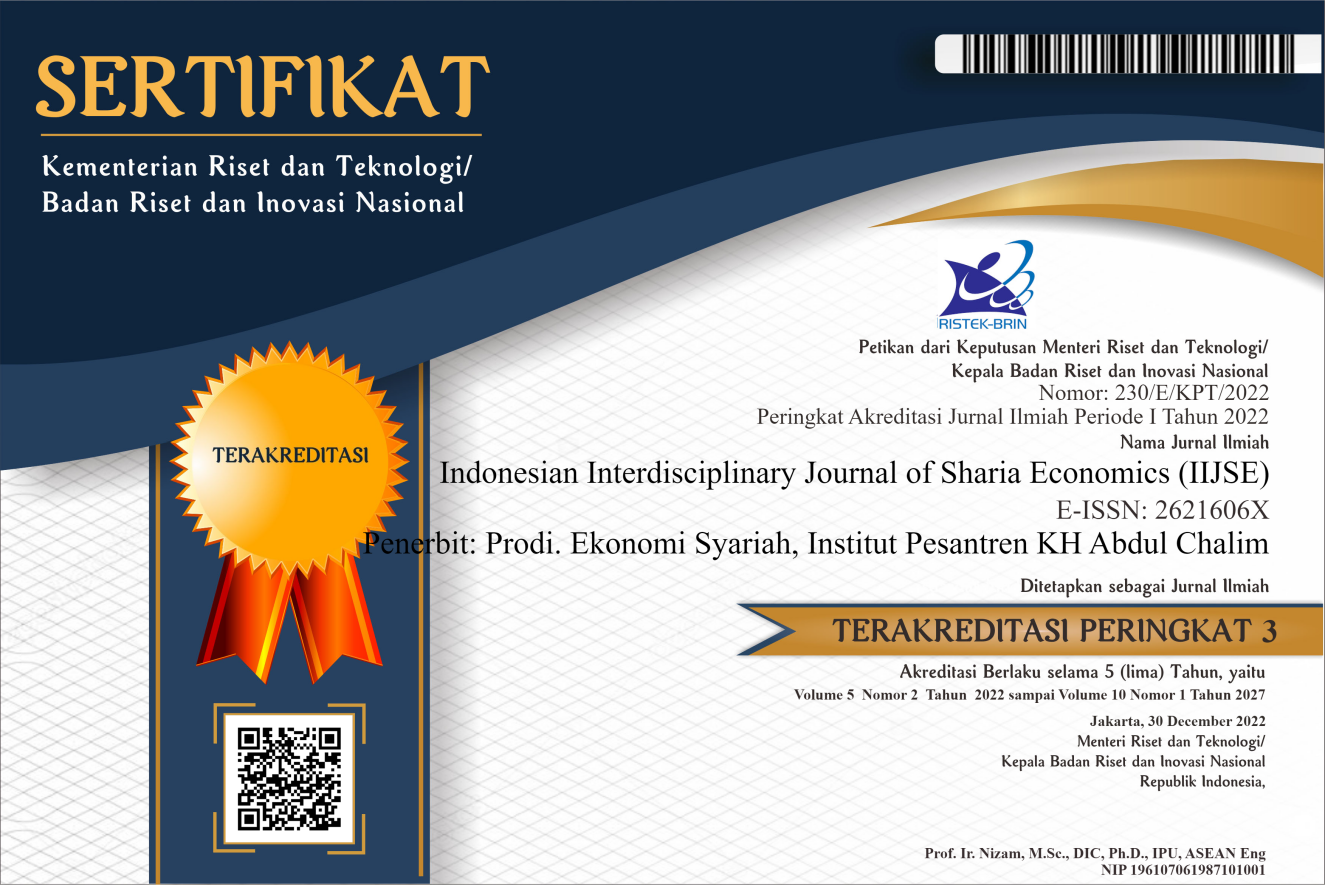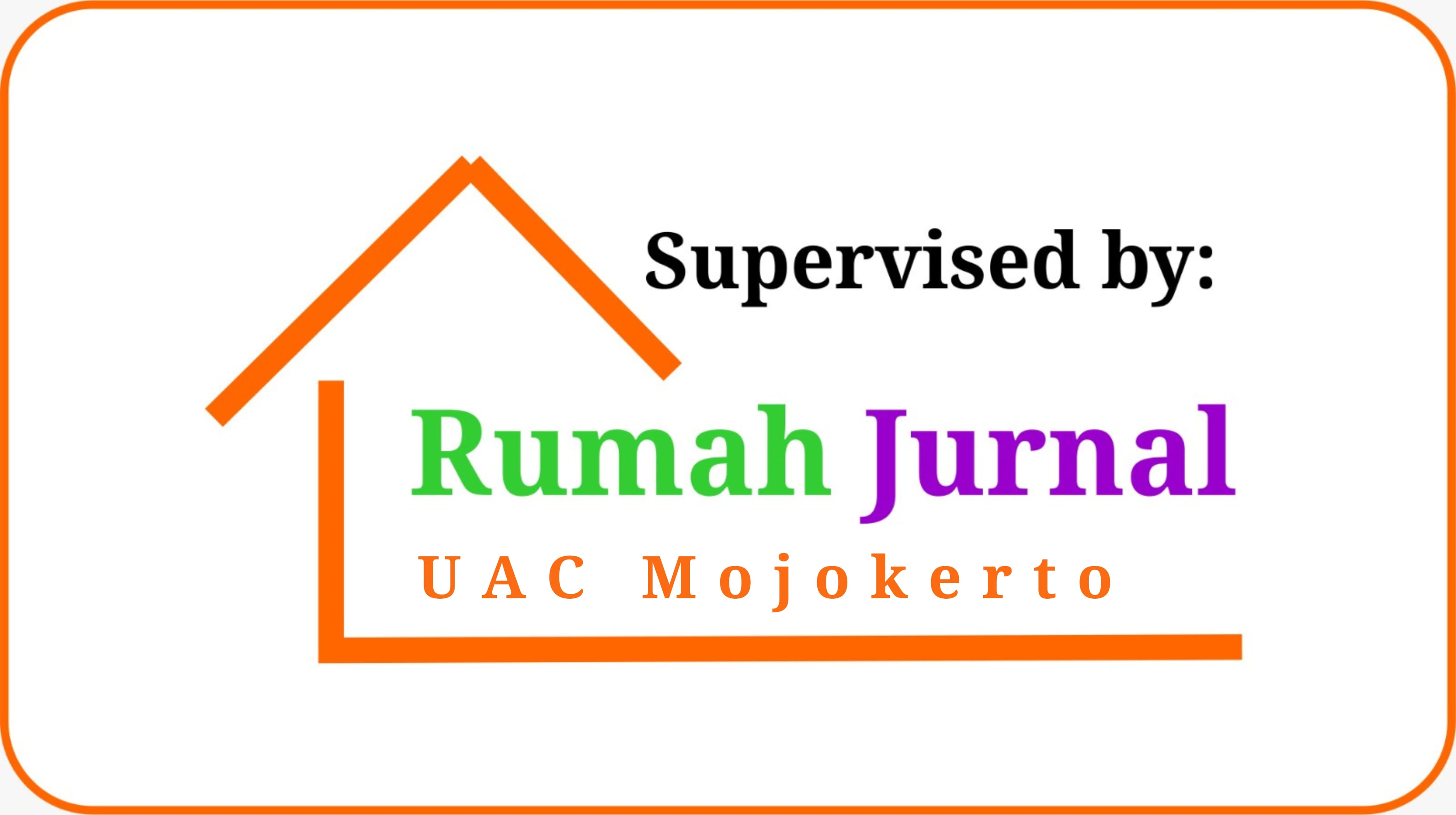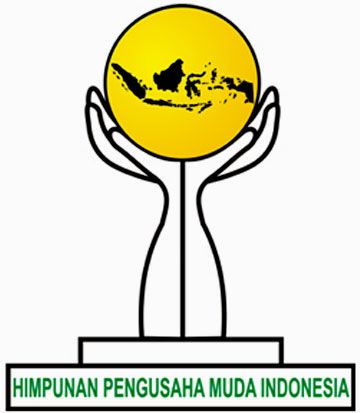Understanding Debt Dynamics: The Role of Financial Literacy, Income, and Lifestyle with Gender as a Moderating Variable
Abstract
This research aims to prove the extent to which the relationship between Financial Literacy, Income, and Lifestyle influences Debt Behavior, apart from that, judging from the psychological factors, women and men have different emotions, which is quite an important consideration in moderating debt behavior, so researchers use gender as a moderating variable. This research has a research focus on Social Humanities, Arts and Culture, and Education with the theme of Economics and human resources on the topic of strengthening human resource capacity which focuses on gender justice, social inclusion, and sustainability following applicable guidelines (Kementrian Pendidikan, Kebudayaan, Riset, 2024). The method used in this research is mixed, namely Quantitative and Quantitative (Quan-Qual). The primary data is collected by distributing questionnaires directly and conducting direct interviews with respondents, while secondary data is in the form of scientific articles and other data that are used as references. The population in this research is all people in the province of West Java. Samples were collected using the Accidental Sampling technique, and statistical testing tools using Structural Equation Modeling (SEM) with SmartPLS software. The research results show that financial literacy, lifestyle, and gender directly influence investment behavior, while income has no impact. Indirectly, financial literacy, income, and lifestyle moderated by gender do not influence investment behavior, meaning that neither men nor women have any influence.
Downloads
References
Amalia, R. (2019). Pengaruh Literasi Keuangan, Tingkat Pendapatan, Dan Status Pernikahan Terhadap Perilaku Berhutang (Studi Kasus Pada Kabupaten Bangkalan). Sekolah Tinggi Ilmu Ekonomi PERBANAS.
Annur, C. M. (2023). Utang Pinjol Warga Jawa Barat Tembus Rp15 Triliun, Terbesar se-Indonesia. Databoks Katadata. https://databoks.katadata.co.id/datapublish/2023/09/21/utang-pinjol-warga-jawa-barat-tembus-rp15-triliun-terbesar-se-indonesia
Asrun, N. A., & Gunawan, A. (2024). Pengaruh Gaya Hidup dan Media Sosial terhadap Perilaku Konsumtif Generasi Z di Kota Medan dengan Literasi Keuangan sebagai Media Intervening. Jurnal Manajemen Bisnis Dan Keuangan, 5(1), 173–186. https://doi.org/10.51805/jmbk.v5i1.205
Atikah, A., & Kurniawan, R. R. (2021). Pengaruh Literasi Keuangan, Locus of Control, dan Financial Self Efficacy Terhadap Perilaku Manajemen Keuangan. JMB : Jurnal Manajemen Dan Bisnis, 10(2), 284–297. https://doi.org/10.31000/jmb.v10i2.5132
Bahovec, V., Barbić, D., & Palić, I. (2015). Testing the effects of financial literacy on debt behavior of financial consumers using multivariate analysis methods. Croatian Operational Research Review, 6(2), 361–371. https://doi.org/10.17535/crorr.2015.0028
Bangsa, D. P. D. P. K. M. U. P. (2020). Roadmap UPB 2020-2025. Direktorat Penelitian Dan Pengabdian Kepada Masyarakat Universitas Pelita Bangsa, 15.
Brilianti, T. R., & Lutfi, L. (2020). Pengaruh pendapatan, pengalaman keuangan dan pengetahuan keuangan terhadap perilaku keuangan keluarga di kota Madiun. Journal of Business and Banking, 9(2), 197. https://doi.org/10.14414/jbb.v9i2.1762
Chen, F., Yu, D., & Sun, Z. (2023). Investigating the associations of consumer financial knowledge and financial behaviors of credit card use. Heliyon, 9(1). https://doi.org/10.1016/j.heliyon.2022.e12713
Darmawan, G. I., Shalmont, J., Nathanael, A., Tania, F. E., & Kandiah, N. (2022). Upaya Sektor Perbankan Guna Menanggulangi Tingginya Non-Performing Loan Pada Masa Pandemi Covid-19. Jatiswara, 37(1), 24–43.
Dihni, V. A. (2022). Berapa Rata-rata Pengeluaran Konsumsi Masyarakat Tiap Bulan? Databoks Katadata. https://databoks.katadata.co.id/datapublish/2022/06/21/berapa-rata-rata-pengeluaran-konsumsi-masyarakat-tiap-bulan
Dwinta, I. dan C. Y. (2010). Pengaruh Locus Of Control, Financial Knowledge, Income Terhadap Financial Management Behavior. Jurnal Bisnis Dan Akuntansi, 12(3), 131–144.
Fitri, N. A., & Basri, H. (2021). Pengaruh Gaya Hidup Terhadap Perilaku Konsumen Pada Generasi Milenial Di Era Pandemi Covid-19 Dengan Pengetahuan Ekonomi Sebagai Variabel Moderasi. EKOMBIS REVIEW: Jurnal Ilmiah Ekonomi Dan Bisnis, 9(2), 183–192.
Hair, J, F., Hult, G, T, M., Ringle, C, M., Sarstedt, M., Danks, N, P., & Rays, S. (2021). Partial Least Squares Structural Equation Modeling (PLS-SEM) Using R. Springer International Publishing.
Herispon, H. (2019). An Empirical Analysis of Household Debt Behavior Determinants. Economics and Finance in Indonesia, 65(2), 132. https://doi.org/10.47291/efi.v65i2.627
Izathi, P. M. (2021). … gaya hidup hedonis dan konformitas teman sebaya dengan perilaku berhutang dissaving pada mahasiswa psikologi Universitas Islam Negeri Maulana Malik ….
Kementrian Pendidikan, Kebudayaan, Riset, dan T. (2024). Buku Panduan Penelitian dan Pengabdian Kepada Masyarakat Tahun 2024. Direktorat Jenderal Pendidikan Tinggi, Riset, dan Teknologi Kementerian Pendidikan, Kebudayaan, Riset, dan Teknologi. https://lldikti6.kemdikbud.go.id/2024/02/19/buku-panduan-penelitian-dan-pengabdian-kepada-masyarakat-tahun-2024-pt-akademik/
Lestari, W., Lindawati, L., Ulum, A. S., & Permana, D. B. (2023). the Mediating and Moderating Effect on Smes’ Performance: Does Religiosity Matter? EL DINAR: Jurnal Keuangan Dan Perbankan Syariah, 11(2), 190–208. https://doi.org/10.18860/ed.v11i2.21043
Lin, C. A., & Bates, T. C. (2022). Smart people know how the economy works: Cognitive ability, economic knowledge and financial literacy. Intelligence, 93(February), 101667. https://doi.org/10.1016/j.intell.2022.101667
Marsela, P. (2019). Pengaruh pendapatan dan konsumtif terhadap perilaku berutang mahasiswa (studi kasus mahasiswa fakultas ekonomi dan bisnis islam iain bengkulu). 1–88.
Putra, P. D., Harahap, K., & Rahmah, S. S. (2020). the Hedonism Lifestyle, Financial Literacy and Financial Management Among Business Education Students To Financial Management. Journal of Community Research and Service, 4(1), 32. https://doi.org/10.24114/jcrs.v4i1.18287
Putri, W. D., Fontanella, A., & Handayani, D. (2023). Pengaruh Penggunaan Financial Technology, Gaya Hidup dan Pendapatan Orang Tua Terhadap Perilaku Keuangan Mahasiswa. Akuntansi Dan Manajemen, 18(1), 51–72. https://doi.org/10.30630/jam.v18i1.213
Risakotta, K. A. (2023). Efek Gender Sebagai Variabel Pemoderasi Pada Pengaruh Literasi Keuangan Dan Gaya Hidup Terhadap Pengelolaan Keuangan. Jurnal Akun Nabelo Jurnal Akuntansi Netral Akuntabel Objektif, 6(1), 985–995. https://doi.org/10.11594/untad.jan.2023.v6.i1.20178
Rona, I, W., & Sinarwati, N, K. (2021). Pengaruh herding bias dan overconfidence bias terhadap pengambilan keputusan investasi. Studi Akuntansi Dan Keuangan Indonesia, 4(2), 104–130.
Rozynek, C., & Lanzendorf, M. (2023). How does low income affect older people’s travel practices? Findings of a qualitative case study on the links between financial poverty, mobility and social participation. Travel Behaviour and Society, 30(October 2022), 312–324. https://doi.org/10.1016/j.tbs.2022.10.003
Rumbianingrum, W., & Wijayangka, C. (2018). Pengaruh literasi keuangan terhadap pengelolaan keuangan UMKM. Almana: Jurnal Manajemen Dan Bisnis, 2(3), 156–164.
Santiara, I. M., & Sinarwati, N. K. (2023). Pengaruh Literasi Keuangan terhadap Pengelolaan Keuangan UMKM di Kecamatan Tejakula. CAPITAL: Jurnal Ekonomi Dan Manajemen, 6(2), 349–355.
Santoso, A., Widowati, S. Y., & Kusnilawati, N. (2022). Keuangan-Perilaku Berhutang : Menakar Faktor-faktor Penentunya. Owner, 6(4), 4232–4239. https://doi.org/10.33395/owner.v6i4.1177
Siregar, Q, R., Jufrizen, J., & Simatupang, J. (2023). Pengaruh Pengetahuan Keuangan, Pendapatan, dan Gaya Hidup Terhadap Perilaku Keuangan Mahasiswa Asahan. Jurnal Akuntansi Dan Keuangan, 2(1), 44–49.
Soleha, E., & Hidayah, Z. Z. (2023a). Pengaruh Literasi Keuangan, Pendapatan, Status Pernikahan dan Haya Hidup Terhadap Perilaku Berhutang. Revitalisasi, 12(1), 83. https://doi.org/10.32503/revitalisasi.v12i1.3799
Soleha, E., & Hidayah, Z. Z. (2023b). Pengaruh_Literasi_Keuanga_Pendapatan_Sta. 12, 83–90.
Soleha, E., & Tan, E. (2023). Peran Financial Literacy dan Income Terhadap Financial Technology dengan Financial Management Behavior Sebagai Variabel Mediasi. 7(2), 605–614. https://doi.org/10.29408/jpek.v7i2.22129
Sufyati HS, & Alvi Lestari. (2022). Pengaruh Literasi Keuangan, Inklusi Keuangan dan Gaya Hidup Terhadap Perilaku Keuangan Pada Generasi Milenial. Jurnal Multidisiplin Madani, 2(5), 2415–2430. https://doi.org/10.55927/mudima.v2i5.396
Tanuwijaya, K., & Setyawan, I. (2021). Can financial literacy become an effective mediator for investment intention? Accounting, 7(7), 1591–1600.
Vinka Khoerunnisa Alifa Putri. (2023). Pengaruh Financial Literacy dan Lifestyle Terhadap Personal Finance. Jurnal Riset Manajemen Dan Bisnis, 1–8. https://doi.org/10.29313/jrmb.v3i1.1776
Wahono, H. K., & Pertiwi, D. (2020). Pengaruh Financial Literacy, Materialism, Compulsive Buying Terhadap Propensity To Indebtedness. International Journal of Financial and Investment Studies (IJFIS), 1(1), 1–14. https://doi.org/10.9744/ijfis.1.1.1-14
Wati, S. H. (2020). Pengaruh Gender, Sikap Keuangan dan Pengetahuan Keuangan Terhadap Perilaku Menabung Masyarakat Di Wilayah Gerbangkertosusila Dengan Dimediasi Locus of Control. Sekolah Tinggi Ilmu Ekonomi Perbanas Surabaya, 20.
Widjaja, R., & Pertiwi, D. (2021). the Influence of Emotional Factors, Materialism, Risk Perception, and Financial Literacy on the Tendency of Debt of Millennial Generation in Surabaya. International Journal of Financial and Investment Studies (IJFIS), 1(2), 85–93. https://doi.org/10.9744/ijfis.1.2.85-93
Widyakto, A., Murtini, D., Hanifah, R. U., & Santoso, A. (2023). Pengaruh Pendidikan Keuangan Di Keluarga, Pegetahuan Keuangan Dan Gaya Hidup Terhadap Perilaku Keuangan. Owner: Riset Dan Jurnal Akuntansi, 7(1), 410–422.
Zulfialdi, M. F., & Sulhan, M. (2023). Pengaruh Literasi Keuangan, Gaya Hidup dan Pengendalian Diri Terhadap Perilaku Keuangan Pada Mahasiswa PTKIN di Jawa Timur. Jurnal Ilmiah Manajemen, Ekonomi, & Akuntansi (MEA), 7(2), 807–820.
Copyright (c) 2025 Zulfa Zakiatul Hidayah, Erin Soleha

This work is licensed under a Creative Commons Attribution-ShareAlike 4.0 International License.
Authors who publish with this journal agree to the following terms:
- Authors retain copyright and grant the journal right of first publication with the work simultaneously licensed under a Creative Commons Attribution License that allows others to share the work with an acknowledgment of the work's authorship and initial publication in this journal.
- Authors are able to enter into separate, additional contractual arrangements for the non-exclusive distribution of the journal's published version of the work (e.g., post it to an institutional repository or publish it in a book), with an acknowledgment of its initial publication in this journal.
- Authors are permitted and encouraged to post their work online (e.g., in institutional repositories or on their website) prior to and during the submission process, as it can lead to productive exchanges, as well as earlier and greater citation of published work.


















